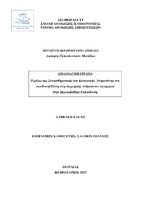| dc.contributor.advisor | Σαλμόν, Ιωάννης | |
| dc.contributor.author | Σαββάκη, Ελένη | |
| dc.date.accessioned | 2017-02-22T11:10:13Z | |
| dc.date.available | 2017-02-22T11:10:13Z | |
| dc.date.issued | 2017-02 | |
| dc.identifier.uri | http://okeanis.lib2.uniwa.gr/xmlui/handle/123456789/3278 | |
| dc.description.abstract | Η παρούσα εργασία πραγματεύεται το ρόλο της συναισθηματικής και κοινωνικής
νοημοσύνης του Διευθυντή/Ηγέτη στη διαχείριση του ανθρώπινου δυναμικού στην
πρωτοβάθμια εκπαίδευση. Η έρευνα επικεντρώνεται στη μελέτη των αντιλήψεων των
εκπαιδευτικών για τη σχέση που έχουν συνιστώσες της συναισθηματικής νοημοσύνης
(αυτοεπίγνωση, αυτοέλεγχος ενσυναίσθηση), καθώς και κοινωνικές ικανότητες
(επικοινωνία, παρακίνηση, διαπραγμάτευση) του Διευθυντή με την οργανωσιακή
κουλτούρα του σχολείου. Το Δείγμα αποτελείται από 112 εκπαιδευτικούς της
πρωτοβάθμιας εκπαίδευσης δημόσιων δημοτικών σχολείων του Πειραιά. Η
μεθοδολογία που επιλέχθηκε ήταν η ποσοτική έρευνα με τη χρήση ερωτηματολογίων.
Τα συμπεράσματα που απορρέουν από την έρευνα, φανερώνουν πως η
συναισθηματική και κοινωνική νοημοσύνη του Διευθυντή συμβάλλει καθοριστικά
στη διαχείριση του ανθρώπινου δυναμικού και στη διαμόρφωση θετικού εργασιακού
κλίματος, το οποίο προκαλεί την επιθυμητή συμπεριφορά με απώτερο σκοπό την
αποτελεσματικότητα του σχολείου. Συνεπώς η έρευνα καταδεικνύει την ανάγκη
ολιστικής προσέγγισης της διαχείρισης των ανθρωπίνων πόρων στην εκπαίδευση,
όπου η πολυσύνθετη λειτουργία, η ασάφεια των στόχων και η ποιοτική προσέγγισή
τους την καθιστά ιδιαίτερα πολύπλοκη | el |
| dc.format.extent | 192 | el |
| dc.language.iso | el | el |
| dc.publisher | Α.Ε.Ι. Πειραιά Τ.Τ. | el |
| dc.rights | Αναφορά Δημιουργού-Μη Εμπορική Χρήση-Όχι Παράγωγα Έργα 3.0 Ελλάδα | * |
| dc.rights.uri | http://creativecommons.org/licenses/by-nc-nd/3.0/gr/ | * |
| dc.subject | TPSH::Διοίκηση και Οργάνωση::Ηγεσία | el |
| dc.subject | TPSH::Κοινωνικές Επιστήμες::Εκπαίδευση | el |
| dc.title | Ο ρόλος της συναισθηματικής και κοινωνικής νοημοσύνης του Διευθυντή/Ηγέτη στη διαχείριση ανθρώπινου δυναμικού στην πρωτοβάθμια εκπαίδευση | el |
| dc.type | Μεταπτυχιακή εργασία | el |
| dc.contributor.committee | Σπυριδάκος, Αθανάσιος | |
| dc.contributor.master | Διοίκηση Εκπαιδευτικών Μονάδων | el |
| dc.subject.keyword | Συναισθηματική νοημοσύνη | el |
| dc.subject.keyword | Κοινωνική νοημοσύνη | el |
| dc.subject.keyword | Διευθυντής σχολικής μονάδας | el |
| dc.subject.keyword | Οργανωσιακή κουλτούρα | el |
| dc.subject.keyword | Διοίκηση ανθρώπινου δυναμικού | el |
| dc.subject.keyword | Ηγεσία | el |
| dc.subject.keyword | Πρωτοβάθμια εκπαίδευση | el |
| dc.description.abstracttranslated | This paper discusses the role of emotional and social intelligence of the School
Director/Leader concerning the management of human resources in Primary
Education. The research focused on the study of the perceptions of teachers in terms
of the abilities of the emotional intelligence (self-awareness, empathy, self-control)
and social skills (communication, motivation, negotiation) of the School Principle
taking into account the organizational culture of the school. The sample consists of
112 teachers of primary public municipal schools of Piraeus. The methodology
chosen was based on a quantitative research using questionnaires. The conclusions
arising from the investigation indicate that the emotional and social intelligence of the
School Director contributes significantly to the management of human resources and
the formulation of positive working conditions, which produces the desired behaviour
with a view to the effectiveness of the school. Therefore, the research demonstrates
the need for a holistic approach with the management of human resources in
education, whereas the complicated function, the vagueness of the objectives and their
qualitative approach makes it really complex. | el |


